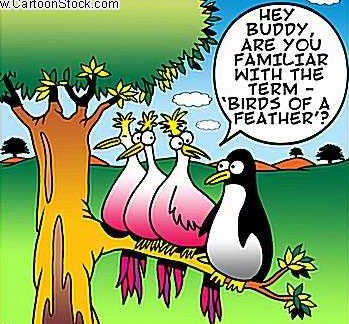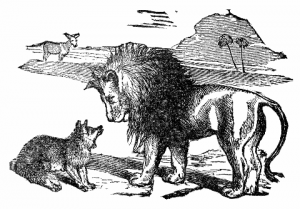Proverbs add the spiciness to language. They are the gems of wisdom. Some great scholars have coined them in order to pass on practical knowledge to us. Proverbs are a great truth with lots of experience and profound thinking. It is the mixture of insight and philosophy. They do not dispute over a point or give explanation of anything; it just tells us a great truth in the most significant way. Most proverbs are coined by anonymous people.
Here are few proverbs with great connotation:
“Birds of the same feather flock together”
People get along well with others who are similar to them. This proverb does not say good people or bad people. It suits both categories. Some birds like swans, geese, cranes, pelicans and flamingos, form tight, V-shaped patterns, while others fly together in loose flocks. It is worth noting that V-shaped structure help birds conserve energy; because each bird flies slightly ahead of the other, which helps them in resisting wind. Similar character people when come together, they can do constructive or destructive work easily, as they can read minds of each other.
“Keep your friends close and your enemies closer”
One must keep a keen eye on his enemies, your enemy can strike any moment without giving warning signals. You must be vigilant of what actions your enemy is taking. Therefore, you must be closer to your enemy then your friends. Also, it’s always better to be on friendly terms with your enemies, but be alert. You need not hurt your enemy by insulting or hurting their feelings, keep calm so that they don’t bother you. Pretend to be friendly with them.
“There’s no such thing as a free lunch”
Nothing is free; even things that appear free often have to be paid for in the end. The maxim refers to the idea that it is impossible for a man to get something for nothing. The “free lunch” refers to the fact that once upon a time, common practice followed in the bars and saloons in United States providing a “free lunch” to patrons who would purchase at least one drink. The variety of foods on offer were high in salt such as ham, cheese, salted nuts, salted fish, salted crackers, salted cashews etc. Those who ate them would end up buying a lot of beer. Naturally, foods high in sodium make you thirsty. The saloons/pubs/bars used this idea to fast sell their alcohol. It also means that if some individuals or group gets something at no cost, somebody else ends up paying for it. If there appears to be no direct cost to any single individual, there is a social cost.
“The early bird catches the worm”
The person who takes the earliest opportunity to do something will gain the advantage over others. It is better to give away the habit of procrastination. We always wish we had a little bit more time to accomplish what we want. Time does not wait for anybody. When we keep putting off a task of some importance, we lose out on many opportunities. When we complete our work in time, we get the extra time to accomplish more. Instead of waiting to finish work till last moment, and get frustrated, it’s better to do it in time.
“A watched pot never boils“
This means that time passes very slowly when one is waiting for something to happen. For example, if you want to strike a deal with somebody, and wait for the so called “right“ time, chances are the right time will never come and deal will never occur. Time slows down when one is waiting for something to get done, it refers to the elongation (stretching of time) when one is waiting for something to happen urgently.
“Beggars can’t be choosers“
When we depend on somebody for something, we cannot dictate terms and we cannot choose what they give us. When you have no money or no power to choose, you have to accept whatever you are given. People with no other options must be content with what is offered.
“Actions speak louder than words”
This proverb means that what you do is more important and it shows your intention and feelings more clearly than what you say. What you do carries more weight than what you say. Often, we see people talking a lot about their intentions, but, their actions are zero. Actions are more significant. It’s always better not to talk before you actually do something.
“Too many cooks spoil the broth”
When too many people handle a task, they spoil the outcome. They get involved in the blame game for not doing a task properly. It becomes impossible to hold one person responsible. When you have too many people working on something even the simplest task can become an utter mess.
“Don’t bite the hand that feeds you”
If someone’s paying you or helping you out, you have to be careful not to make the person angry, not to upset him. You must not badmouth this helpful person in his absence. If you do so, you are risking losing those benefits altogether. You might not agree with your parents’ rules, but don’t bite the hand that feeds you, because you owe everything you have to them.
“All good things must come to an end”
There is an end to everything, to good things as well. The proverb also means that bad things will also come to an end. In short, nothing lasts forever.
“Familiarity breeds contempt”
If you get very close to somebody, you see their bad qualities also and you stop respecting the person. This refers to what often happens in long-standing relationships and marriages. Regrettably, over time too may relationships begin to see the happiness fade away. In relationships, the problem is not with familiarity, but more about that which we get acclimatised; disrespect, dishonour, and negative energy all too often becomes familiar subject in relationships. These are the elements that cause contempt.
“A chain is only as strong as its weakest link”
If one member of a team doesn’t perform well, the whole team will fail. This means that processes, organisations, etc, are vulnerable because the weakest person or part can always damage or break them. It refers to personal or technical failure in a team due to one component rather than an actual chain. Anne Robinson hosted a show called ‘The Weakest Link’ in the United Kingdom. This is the most popular reference to this proverb. The lack of knowledge and banking at the correct time causes people to lose money on this show and hence the person responsible is termed as the weakest link. The show humiliates the weakest link and cuts them off. The proverb was first published by Thomas Reid in 1786 in his work called ‘The Essays on the Intellectual Powers of Man’. It’s seen that the weakest part of something jeopardizes the quality and effectiveness.
So, my dear friends, proverbs add essence to communications, especially, when you use the right proverb at right time.
















































